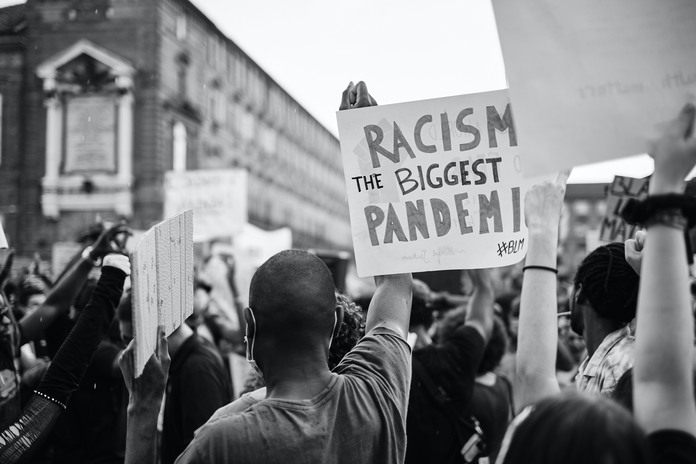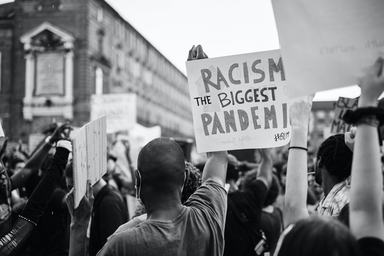The wider discourse of decolonising Kings in any aspect has been an ongoing and slow moving theme. A fellow student and I recently conducted an internal review specifically of the Geography department, alongside a wider working group in other departments.
In this time of protest and outrage after the ongoing maltreatment of Black people across the Globe, my co-author and I also want to emphasise our shared outrage and deep disgust of the continued systematic racism in the USA, UK and at KCL. This report was produced in solidarity with African, Indigenous, Afro-descendant and working-class communities in Palestine, Guadeloupe, Kashmir, London and in prisons around the world who are resisting oppression on a daily basis, possible, because of our continuing support for these violent projects. Silence and passivity is complicity.
It is very important to us that we share our research with the wider community, as the outcome of the report can be embedded into new practices, and pressure placed on institutions to affect greater change.
The common discourse in the community at Kings rarely recognises its colonial past, the smothering of key critical modules plainly appears to be an act of continuing this veil, a narrative of internationality and belonging at Kings comes in stark contrast to the true subtle actions of actively failing to even begin shedding light on the issues, racism, and inequality that has come from colonialism, and therefore failing to begin to make change.
The reports takes the term “Decolonise” which prioritises, without compromise, the entirety of human life over blind and blunt ideologies. It encompasses our aim to allow for and encourage alternative forms of producing knowledge that do not replicate the divide between the Global South and North; one where knowledge in the Global North is viewed as the superior and ultimately only legitimate source. Neither is knowledge dissociated from practice.
In essence, we worked to evaluate to what extent the curriculum and practices of the Geography department replicated colonial power structures and mechanisms of domination such as white supremacy, imperialism and hetero-patriarchy, both in teaching and academic writing and research, examining to what extent euro-centrism pervades the different module curricula. We believe the following recommendations are relevant and necessary to improve the department in this manner.
A repeated criticism from students and the available curricula points to a narrative that shelters students from critical discussions on decolonising the curriculum, in turn failing to expose students to the ongoing debates, and therefore reducing their ability to engage critically with material. Students discussed the need for greater emphasis on a wide range of critical material which is also more progressive rather than a reliance on traditional scholars. Mark schemes and reading lists should encourage wider engagement with material such as this, with other suggestions directed at the faculty to arrange discussion groups to facilitate this engagement.
Current affairs integration in the curriculum seems a key theme that students point to in encouraging their wider commitment with critical debates. Many emphasise the fact that first year modules fail to allow for exposure to critical ideas specifically undoing the colonial power structures that Kings as an institution materialises in its own practices, and therefore departments are encouraged to begin this work from the outset for students, as this allows students time to build their own perspectives without a bias framework.
In 2020, Professor Ed Byrne and KCLSU President Shaswat Jain signed an agreement outlining how the union and the university will work together this academic year, ensuring every King’s student has the best possible experience. A key priority to be included in this (among others) was the campaign to decolonise the curriculum and liberate education at Kings. However, this comes at stark contrast to the actual actions that are taking place within departments. This priority seems more as a placeholder, a token promise of action to settle down the criticisms and calls for decolonisation, where in actual fact, key critical modules and discussions are being discontinued with un-legitimate justifications, clearly not fulfilling the claim the Professor Ed Byrne made when signing this agreement.
Although this project was focused on the department of Geography, the institution of Kings as a whole undoubtedly maintains structural inequality and neo-colonial power structures in its foundations, beyond the departments of Arts and Humanities and social sciences, and therefore recommendations can be applied widely and un-objectively. The work that Kings appears to be doing in terms of decolonising the curriculum so far seems symbolic rather than active, in which there are in fact still huge underlying structural inequalities and mechanisms that reinforce historical colonial power relations of a dominant white class. We are angered that many students feel shielded and almost indoctrinated through a curriculum that constrains critical thinking in the field of decolonisation and equality, and we hope to begin to liberate students from these constraints.



